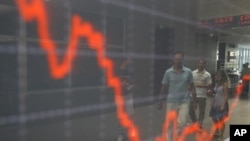As global stock markets have plummeted in the last few days, both Greece and South Korea have banned the short-selling of securities - the attempt by some investors to make money by betting that their holdings will decrease in value.
Monday, Greece ordered a halt in the short selling of stocks, and South Korea did the same on Tuesday. In both countries, stock indexes fell sharply in the aftermath of Standard & Poor's downgrading of the U.S. government's credit rating and cost investors billions of dollars in losses.
That led stock exchange officials in Athens and Seoul to impose the short-selling ban in an attempt to curb speculation by investors that their markets would fall even further.
In short-selling, the stock seller does not actually own shares of a company. But the seller borrows the shares, likely from an investment broker, and sells them, on the expectation that their value will fall. At that point, the investor can buy them back at a lower price and keep the difference as profit. If the shares rise in value, the investor would lose money.
Some financial analysts say the bans may not have the desired effect of ending the stock sell-off. But one South Korean market official said short-selling "triggered market instability." One Greek official said the practice was "really having an effect" on the Athens market as it fell to its lowest point in 14 years.
The Greek ban on short-selling extends to October 7, although could be lifted sooner. South Korea imposed a three-month ban.
Greece, South Korea Ban Stock Short-Sells




